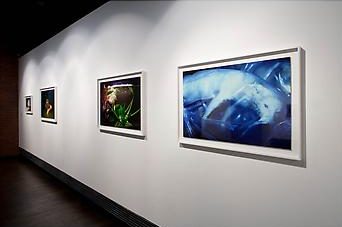CANARY
Manggha Center of Japanese Art and Technology, Krakow
Lieko Shiga
May 18th – July 17th, 2012
Press Release
Krakow Photomonth Festival 2012
Manggha Center of Japanese Art and Technology
Organizer: Foundation for Visual Arts
Partners: Manggha Center of Japanese Art and Technology, Galerie Priska Pasquer
Curator: Ferdinand Brüggemann
Liego Shiga (1980) is a Japanese photographer based in Miyagi prefecture, Japan. She lived in London for several years, and graduated from Chelsea College of Art and Design in 2004. She herself explains that her limited ability in English and lack of money for expensive materials led her towards a more introverted approach and to devise her own techniques. Initially she used cheaper prints, which she cut and perforated, then backlit so light shone through the holes, and then photographed again. These were published in three books: Jacques Saw Me Tomorrow Morning, Lilly, and Damien Court). Though Shiga’s techniques have evolved, her conceptual approach remains constant: for her, photographs are the sum of experiences that led her to a place—a site where she stages a scenario. For the Canary series, she asked the residents of Brisbane, Australia, and Sendai, Japan, to choose the “lightest” and “darkest” places in each city; based on that information she attempted to find links between the place and the person who chose it.
Press Release
Krakow Photomonth Festival 2012
Manggha Center of Japanese Art and Technology
Organizer: Foundation for Visual Arts
Partners: Manggha Center of Japanese Art and Technology, Galerie Priska Pasquer
Curator: Ferdinand Brüggemann
Liego Shiga (1980) is a Japanese photographer based in Miyagi prefecture, Japan. She lived in London for several years, and graduated from Chelsea College of Art and Design in 2004. She herself explains that her limited ability in English and lack of money for expensive materials led her towards a more introverted approach and to devise her own techniques. Initially she used cheaper prints, which she cut and perforated, then backlit so light shone through the holes, and then photographed again. These were published in three books: Jacques Saw Me Tomorrow Morning, Lilly, and Damien Court). Though Shiga’s techniques have evolved, her conceptual approach remains constant: for her, photographs are the sum of experiences that led her to a place—a site where she stages a scenario. For the Canary series, she asked the residents of Brisbane, Australia, and Sendai, Japan, to choose the “lightest” and “darkest” places in each city; based on that information she attempted to find links between the place and the person who chose it.



